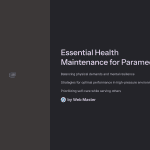
 Working night shifts as an Emergency Medical Technician (EMT) presents unique challenges, including disrupted sleep patterns, fatigue, and increased stress levels. To perform efficiently and maintain personal well-being, EMTs must adopt strategic habits to cope with overnight duties. This guide provides practical survival tips for handling night shifts effectively.
Working night shifts as an Emergency Medical Technician (EMT) presents unique challenges, including disrupted sleep patterns, fatigue, and increased stress levels. To perform efficiently and maintain personal well-being, EMTs must adopt strategic habits to cope with overnight duties. This guide provides practical survival tips for handling night shifts effectively.
Adjusting Your Sleep Schedule for Night Shifts
One of the biggest challenges of night shifts is adjusting your sleep schedule. Since your body is naturally programmed to be awake during the day, switching to a nocturnal routine requires deliberate effort.
- Gradual Adaptation: Try shifting your sleep schedule gradually before starting night shifts. Adjust your bedtime by 1-2 hours each day to ease into the transition.
- Daytime Sleep Optimization: Use blackout curtains, white noise machines, and eye masks to simulate nighttime conditions and improve sleep quality.
- Power Naps: Short naps (20-30 minutes) before and during shifts can help maintain alertness and combat fatigue.
Managing Energy Levels and Nutrition
Maintaining high energy levels during night shifts is crucial for staying alert and providing optimal patient care. The right diet and hydration strategies can make a significant difference.
- Balanced Meals: Avoid heavy, greasy foods that can cause sluggishness. Opt for proteins, complex carbohydrates, and healthy fats to sustain energy.
- Hydration: Drink plenty of water and avoid excessive caffeine intake, which can disrupt your sleep later.
- Strategic Snacking: Healthy snacks like nuts, fruits, and yogurt provide steady energy without sudden crashes.

Staying Mentally and Physically Alert
Remaining alert during night shifts is essential for quick decision-making and emergency response.
- Movement Breaks: Engage in light physical activities like stretching or short walks to prevent drowsiness.
- Engage Your Mind: Listen to music, talk to colleagues, or do mental exercises during slow periods to keep your brain active.
- Use Caffeine Wisely: If needed, consume caffeine in moderate amounts at the beginning of your shift to prevent energy crashes later.

Managing Stress and Emotional Well-being
Night shifts can be stressful, particularly in emergency medical services where high-pressure situations are frequent.
- Practice Stress Management: Engage in mindfulness techniques such as deep breathing or meditation to reduce anxiety.
- Stay Connected: Maintain communication with friends and family to prevent feelings of isolation.
- Seek Support: Talk to colleagues and supervisors about challenges and seek professional support if needed.

Safety Precautions During Night Shifts
Working late hours can expose EMTs to safety risks, such as drowsy driving and working in unfamiliar or high-risk areas.
- Avoid Driving When Fatigued: Take a brief rest before heading home after a shift to reduce the risk of accidents.
- Use the Buddy System: Whenever possible, work with a partner in risky environments.
- Stay Aware of Your Surroundings: Remain vigilant and use protective measures in high-risk situations.
6imz_ Balancing Work and Personal Life
Maintaining a healthy work-life balance is essential for long-term career sustainability.
- Schedule Social Time: Plan activities with loved ones on your days off to maintain relationships.
- Engage in Hobbies: Pursue activities outside of work to relieve stress and maintain personal fulfillment.
- Prioritize Self-Care: Ensure adequate sleep, exercise, and personal downtime to recharge for the next shift.
*Capturing unauthorized images is prohibited*







